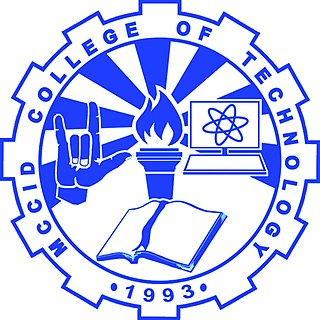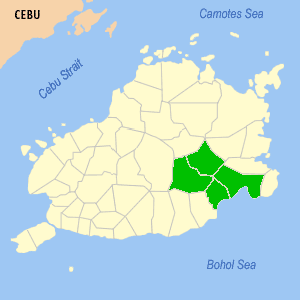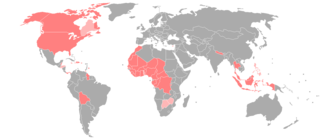Related Research Articles

Bohol, officially the Province of Bohol, is an island province of the Philippines located in the Central Visayas region, consisting of the island itself and 75 minor surrounding islands. Its capital is Tagbilaran. With a land area of 4,821 km2 (1,861 sq mi) and a coastline 261 km (162 mi) long, Bohol is the tenth largest island of the Philippines.

Deaf culture is the set of social beliefs, behaviors, art, literary traditions, history, values, and shared institutions of communities that are influenced by deafness and which use sign languages as the main means of communication. When used as a cultural label especially within the culture, the word deaf is often written with a capital D and referred to as "big D Deaf" in speech and sign. When used as a label for the audiological condition, it is written with a lower case d. Carl G. Croneberg coined the term "Deaf Culture" and he was the first to discuss analogies between Deaf and hearing cultures in his appendices C/D of the 1965 Dictionary of American Sign Language.

Carlos Polestico Garcia was a Filipino teacher, poet, orator, lawyer, public official, political economist, guerrilla and Commonwealth military leader who was the eighth president of the Philippines. A lawyer by profession, Garcia entered politics when he became representative of Bohol’s 3rd district in the House of Representatives. He then served as a senator from 1945 to 1953. In 1953 he was the running mate of Ramon Magsaysay in the 1953 presidential election. He then served as vice president from 1953 to 1957. After the death of Magsaysay in March 1957, he succeeded to the presidency. He won a full term in the 1957 presidential election. He ran for a second full term as president in the 1961 presidential election and was defeated by Vice President Diosdado Macapagal.

Tagbilaran, officially known as the City of Tagbilaran, is a 3rd class component city and capital of the province of Bohol, Philippines. According to the 2020 census, it has a population of 104,976 people.

Manila Christian Computer Institute for the Deaf (MCCID) is a non-sectarian, post-secondary, Christian foundation school for the deaf in the Philippines authorized by the Technical Education and Skills Development Authority (TESDA) to offer non-degree computer and other technical training programs.

Francisco Dagohoy was a Filipino revolutionary who holds the distinction of having initiated the longest revolt in Philippine history, the Dagohoy Rebellion. This rebellion against the Spanish colonial government took place on the island of Bohol from 1744 to 1829, roughly 85 years. Francisco Dagohoy started the revolt at the age of 20. He probably died before 1829 due to either old age or sickness.

The Eskaya, less commonly known as the Visayan-Eskaya, is the collective name for the members of a cultural minority found in Bohol, Philippines, which is distinguished by its cultural heritage, particularly its literature, language, dress and religious observances. After the Eskaya first came to public attention in 1980, these cultural practices were the subject of intense speculation on the part of local journalists and amateur historians who made diverse claims about the ethnolinguistic status of the Eskaya people. The unique Eskayan language and writing system in particular has been a source of fascination and controversy. Some journalists argued that the Eskaya were historically displaced from the Middle East, while others suggested that the community was a cult speaking an invented language. According to Eskaya mythology, the language and script was created through divine inspiration by the ancestor Pinay who based it on the human body. Suppressed by the Spanish colonists, Pinay's language was said to have resurfaced under the leadership of Mariano Datahan, a veteran of Bohol's republican army. Although the historical existence of Pinay cannot be confirmed, more recent studies that combined linguistic analysis with oral history and genealogical research provide evidence that the Eskaya language was most likely created and disseminated within a generation by a charismatic individual. Today, the Eskaya are officially classified as an Indigenous Cultural Community under The Indigenous Peoples Rights Act of 1997. A number of reports have suggested that Eskaya linguistic and cultural education has been in steady decline since the mid-1980s, although promising revitalisation efforts have also been documented.
An idea is an image existing or formed in the mind.
CAP College Foundation, Inc. is a private, non-sectarian distance learning college in the Philippines.

The Philippine Federation of the Deaf, Inc. (PFD) is a non-stock, non-profit organization which caters to the general needs of deaf people in the Philippines.
Filipino Sign Language (FSL) or Philippine Sign Language, is a sign language originating in the Philippines. Like other sign languages, FSL is a unique language with its own grammar, syntax and morphology; it is neither based on nor resembles Filipino or English. Some researchers consider the indigenous signs of FSL to be at risk of being lost due to the increasing influence of ASL.
Cecilio Kapirig Putong was a Filipino scholar, educator, writer, UNESCO fellow, author. In 1952, he became the Secretary of Education of the Philippines. He was one of the most brilliant minds from Bohol having a reported IQ of 138 based on Otis Intelligence Scale Test.
Bohol Deaf Academy (BDA) is a private, coed, residential Philippine high school for deaf students, located in Tagbilaran City, Bohol. It was established in 2005 and specializes in advanced academic and vocational instruction for college and work-bound students.

PMI Colleges, formerly known as Philippine Maritime Institute, is a private, non-sectarian, co-educational higher education, Maritime institution established on September 18, 1948 in Santa Cruz, Manila, Philippines where its main campus is located.
Maradeka is an emerging pro-democracy Muslim political organization espousing non-violent political action in the Philippines amidst the backdrop of over four decades of armed Muslim insurgency mounted by Moro National Liberation Front (MNLF) and Moro Islamic Liberation Front (MILF) in their Moro Quest for self-rule after people dissenting Philippine government treatment of Muslim minority as second class citizens and suffering years of social, economic, and political inequities called Mindanao problem

The 2013 Bohol earthquake occurred on October 15 at 8:12:31 PST in Bohol, an island province located in Central Visayas, Philippines. The magnitude of the earthquake was recorded at Mw 7.2, with epicenter 6 kilometres (3.7 mi) S 24° W of Sagbayan, and its depth of focus was 12 kilometres (7.5 mi). It affected the whole Central Visayas region, particularly Bohol and Cebu. The earthquake was felt in the whole Visayas area and as far as Masbate island in the north and Cotabato provinces in southern Mindanao.

American Sign Language (ASL) developed in the United States and Canada, but has spread around the world. Local varieties have developed in many countries, but there is little research on which should be considered dialects of ASL and which have diverged to the point of being distinct languages.

In the Philippines, disability is one of the social issues affecting a portion of the Philippines' population. To ensure the equality and rights of disabled persons, there are Philippine laws and policies that were passed regarding persons with disabilities (PWDs). There are also numerous non-government associations that seeks to encourage and help improve the wellbeing of people with disabilities.
References
- ↑ Olson, JR (1989). "Project IDEA: International Deaf Education Association". American Annals of the Deaf. 134 (5): 338–40. doi:10.1353/aad.2012.0527. PMID 2618924. S2CID 35114448.
- ↑ International Deaf Education Association, volunteermatch.org